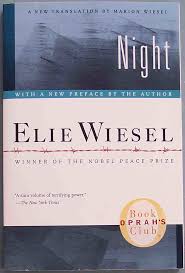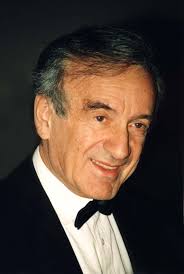Night Page #6
"Night" is a work by Elie Wiesel about his experience with his father in the Nazi German concentration camps at Auschwitz and Buchenwald in 1944–1945, at the height of the Holocaust toward the end of the Second World War. In just over 100 pages of sparse and fragmented narrative, Wiesel writes about the death of God and his own increasing disgust with humanity, reflected in the inversion of the parent–child relationship, as his father declines to a helpless state and Wiesel becomes his resentful teenage caregiver. "If only I could get rid of this dead weight ... Immediately I felt ashamed of myself, ashamed forever." In Night everything is inverted, every value destroyed. "Here there are no fathers, no brothers, no friends", a kapo tells him. "Everyone lives and dies for himself alone." Wiesel was 16 when Buchenwald was liberated by the United States Army in April 1945, too late for his father, who died after a beating while Wiesel lay silently
Our nerves had reached a breaking point. Our very skin was aching. It was as though madness had infected all of us. We gave up. A few young men forced her to sit down, then bound and gagged her. Silence fell again. The small boy sat next to his mother, crying. I started to breathe normally again as I listened to the rhythmic pounding of the wheels on the tracks as the train raced through the night. We could begin to doze again, to rest, to dream... And so an hour or two passed. Another scream jolted us. The woman had broken free of her bonds and was shouting louder than before: "Look at the fire! Look at the flames! Flames everywhere..." Once again, the young men bound and gagged her. When they actually struck her, people shouted their approval: "Keep her quiet! Make that madwoman shut up. She's not the only one h e r e ... " She received several blows to the head, blows that could have been lethal. Her son was clinging desperately to her, not uttering a word. He was no longer crying. The night seemed endless. By daybreak, Mrs. Schächter had settled down. Crouching in her corner, her blank gaze fixed on some faraway place, she no longer saw us. She remained like that all day, mute, absent, alone in the midst of us. Toward evening she began to shout again: "The fire, over there!" She was pointing somewhere in the distance, always the same place. No one felt like beating her anymore. The heat, the thirst, the stench, the lack of air, were suffocating us. Yet all that was nothing compared to her screams, which tore us apart. A few more days and all of us would have started to scream. But we were pulling into a station. Someone near a window read to us: "Auschwitz." Nobody had ever heard that name. THE TRAIN did not move again. The afternoon went by slowly. Then the doors of the wagon slid open. Two men were given permission to fetch water. When they came back, they told us that they had learned, in exchange for a gold watch, that this was the final destination. We were to leave the train here. There was a labor camp on the site. The conditions were good. Families would not be separated. Only the young would work in the factories. The old and the sick would find work in the fields. Confidence soared. Suddenly we felt free of the previous nights' terror. We gave thanks to God. Mrs. Schächter remained huddled in her corner, mute, untouched by the optimism around her. Her little one was stroking her hand. Dusk began to fill the wagon. We ate what was left of our food. At ten o'clock in the evening, we were all trying to find a position for a quick nap and soon we were dozing. Suddenly: "Look at the fire! Look at the flames! Over there!" With a start, we awoke and rushed to the window yet again. We had believed her, if only for an instant. But there was nothing outside but darkness. We returned to our places, shame in our souls but fear gnawing at us nevertheless. As she went on howling, she was struck again. Only with great difficulty did we succeed in quieting her down. The man in charge of our wagon called out to a German officer strolling down the platform, asking him to have the sick woman moved to a hospital car. "Patience," the German replied, "patience. She'll be taken there soon." Around eleven o'clock, the train began to move again. We pressed against the windows. The convoy was rolling slowly. A quarter of an hour later, it began to slow down even more. Through the windows, we saw barbed wire; we understood that this was the camp. We had forgotten Mrs. Schächter's existence. Suddenly there was a terrible scream: "Jews, look! Look at the fire! Look at the flames!" And as the train stopped, this time we saw flames rising from a tall chimney into a black sky. Mrs. Schächter had fallen silent on her own. Mute again, indifferent, absent, she had returned to her corner. We stared at the flames in the darkness. A wretched stench floated in the air. Abruptly, our doors opened. Strange-looking creatures, dressed in striped jackets and black pants, jumped into the wagon. Holding flashlights and sticks, they began to strike at us left and right, shouting: "Everybody out! Leave everything inside. Hurry up!" We jumped out. I glanced at Mrs. Schächter. Her little boy was still holding her hand. In front of us, those flames. In the air, the smell of burning flesh. It must have been around midnight. We had arrived. In Birkenau. THE BELOVED OBJECTS that we had carried with us from place to place were now left behind in the wagon and, with them, finally, our illusions. Every few yards, there stood an SS man, his machine gun trained on us. Hand in hand we followed the throng. An SS came toward us wielding a club. He commanded: "Men to the left! Women to the right!" Eight words spoken quietly, indifferently, without emotion. Eight simple, short words. Yet that was the moment when I left my mother. There was no time to think, and I already felt my father's hand press against mine: we were alone. In a fraction of a second I could see my mother, my sisters, move to the right. Tzipora was holding Mother's hand. I saw them walking farther and farther away; Mother was stroking my sister's blond hair, as if to protect her. And I walked on with my father, with the men. I didn't know that this was the moment in time and the place where I was leaving my mother and Tzipora forever. I kept walking, my father holding my hand.29 Behind me, an old man fell to the ground. Nearby, an SS man replaced his revolver in its holster. My hand tightened its grip on my father. All I could think of was not to lose him. Not to remain alone. The SS officers gave the order. "Form ranks of fives!" There was a tumult. It was imperative to stay together. "Hey, kid, how old are you?" The man interrogating me was an inmate. I could not see his face, but his voice was weary and warm. "Fifteen." "No. You're eighteen." "But I'm not," I said. "I'm fifteen." "Fool. Listen to what I say." Then he asked my father, who answered: "I'm fifty." "No." The man now sounded angry. "Not fifty. You're forty. Do you hear? Eighteen and forty." He disappeared into the darkness. Another inmate appeared, unleashing a stream of invectives: "Sons of bitches, why have you come here? Tell me, why?" Someone dared to reply: "What do you think? That we came here of our own free will? That we asked to come here?" The other seemed ready to kill him: "Shut up, you moron, or I'll tear you to pieces! You should have hanged yourselves rather than come here. Didn't you know what was in store for you here in Auschwitz? You didn't know? In 1944?" True. We didn't know. Nobody had told us. He couldn't believe his ears. His tone became even harsher: "Over there. Do you see the chimney over there? Do you see it? And the flames, do you see them?" (Yes, we saw the flames.) "Over there, that's where they will take you. Over there will be your grave. You still don't understand? You sons of bitches. Don't you understand anything? You will be burned! Burned to a cinder! Turned into ashes!" His anger changed into fury. We stood stunned, petrified. Could this be just a nightmare? An unimaginable nightmare? I heard whispers around me: "We must do something. We can't let them kill us like that, like cattle in the slaughterhouse. We must revolt." There were, among us, a few tough young men. They actually had knives and were urging us to attack the armed guards. One of them was muttering: "Let the world learn about the existence of Auschwitz. Let everybody find out about it while they still have a chance to escape" But the older men begged their sons not to be foolish: "We mustn't give up hope, even now as the sword hangs over our heads. So taught our s a g e s ... " The wind of revolt died down. We continued to walk until we came to a crossroads. Standing in the middle of it was, though I didn't know it then, Dr. Mengele, the notorious Dr. Mengele. He looked like the typical SS officer: a cruel, though not unintelligent, face, complete with monocle. He was holding a conductor's baton and was surrounded by officers. The baton was moving constantly, sometimes to the right, sometimes to the left. In no time, I stood before him. "Your age?" he asked, perhaps trying to sound paternal. "I'm eighteen." My voice was trembling. "In good health?" "Yes." "Your profession?"
Translation
Translate and read this book in other languages:
Select another language:
- - Select -
- 简体中文 (Chinese - Simplified)
- 繁體中文 (Chinese - Traditional)
- Español (Spanish)
- Esperanto (Esperanto)
- 日本語 (Japanese)
- Português (Portuguese)
- Deutsch (German)
- العربية (Arabic)
- Français (French)
- Русский (Russian)
- ಕನ್ನಡ (Kannada)
- 한국어 (Korean)
- עברית (Hebrew)
- Gaeilge (Irish)
- Українська (Ukrainian)
- اردو (Urdu)
- Magyar (Hungarian)
- मानक हिन्दी (Hindi)
- Indonesia (Indonesian)
- Italiano (Italian)
- தமிழ் (Tamil)
- Türkçe (Turkish)
- తెలుగు (Telugu)
- ภาษาไทย (Thai)
- Tiếng Việt (Vietnamese)
- Čeština (Czech)
- Polski (Polish)
- Bahasa Indonesia (Indonesian)
- Românește (Romanian)
- Nederlands (Dutch)
- Ελληνικά (Greek)
- Latinum (Latin)
- Svenska (Swedish)
- Dansk (Danish)
- Suomi (Finnish)
- فارسی (Persian)
- ייִדיש (Yiddish)
- հայերեն (Armenian)
- Norsk (Norwegian)
- English (English)
Citation
Use the citation below to add this book to your bibliography:
Style:MLAChicagoAPA
"Night Books." Literature.com. STANDS4 LLC, 2025. Web. 30 Jan. 2025. <https://www.literature.com/book/night_336>.








Discuss this Night book with the community:
Report Comment
We're doing our best to make sure our content is useful, accurate and safe.
If by any chance you spot an inappropriate comment while navigating through our website please use this form to let us know, and we'll take care of it shortly.
Attachment
You need to be logged in to favorite.
Log In